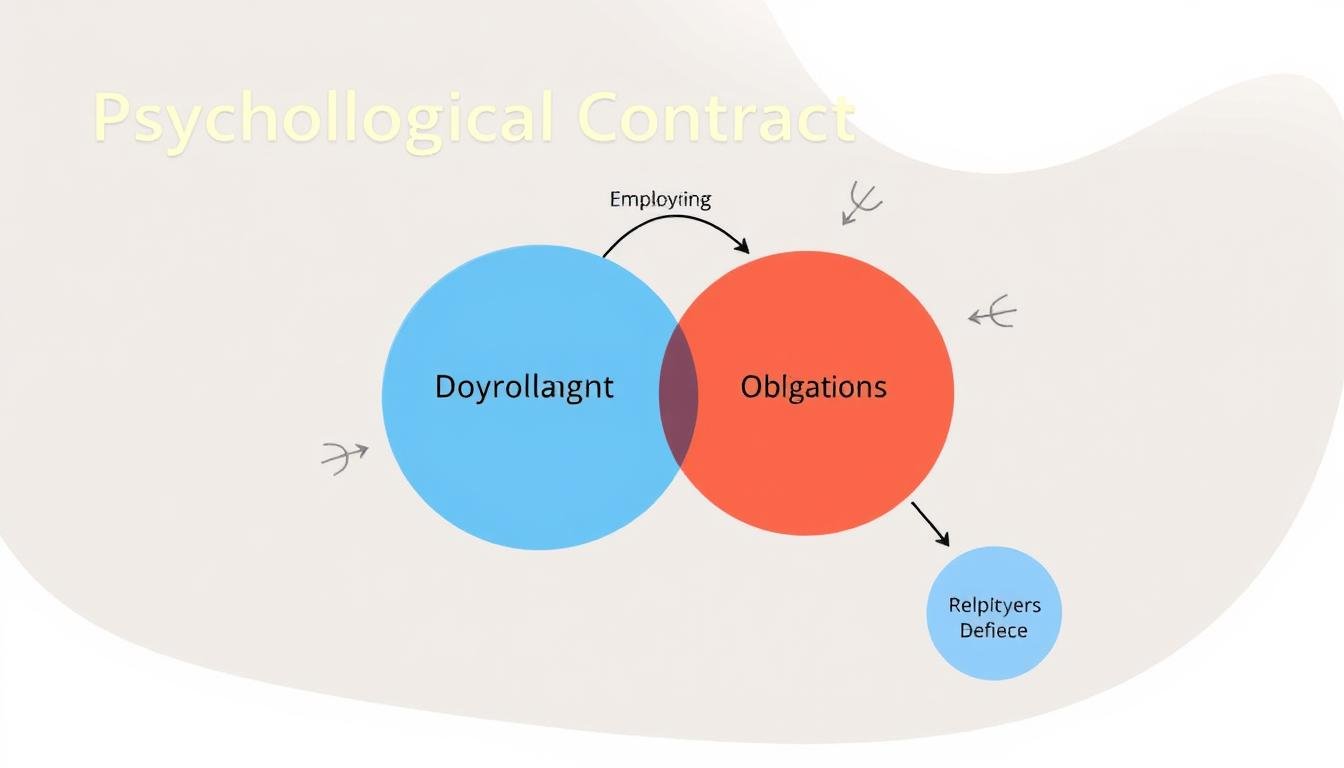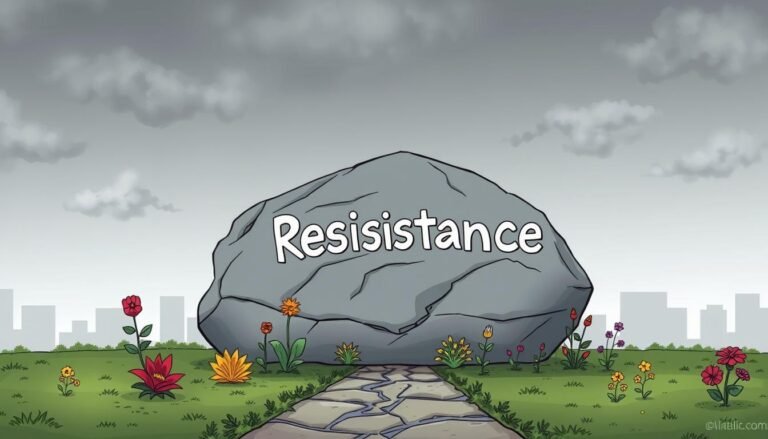Psychological Contract Theory
Psychological Contract Theory looks at the hidden expectations between bosses and workers. It’s about the unspoken rules that shape how we work together. It’s more than just legal agreements; it’s about the shared beliefs and duties that guide our daily tasks.
The concept of Psychological Contract Theory started in 1960, thanks to Chris Argyris. Denise Rousseau made big contributions from 1989 on. This theory helps us get the complex dynamics of work relationships in today’s companies.
At its heart, Psychological Contract Theory shows how silent agreements shape how we act at work. It explains why workers might feel let down if their hopes aren’t met, even if no rules were broken. This theory is key to understanding job happiness and success.
Key Takeaways
- Psychological Contract Theory deals with unwritten workplace expectations
- It influences employee-employer relationships beyond legal contracts
- The theory was first introduced in 1960 and has evolved significantly
- It helps explain workplace satisfaction and productivity
- Understanding this theory is crucial for effective organizational behavior
Understanding the Foundations of Psychological Contract Theory
Psychological Contract Theory is key in Organizational Behavior studies. It looks at the unspoken agreements between employers and employees. These agreements deeply shape how workplaces function.
Definition and Core Concepts
At its core, Psychological Contract Theory is about the hidden agreements between workers and companies. It’s not just about formal contracts. It’s about the mutual promises and expectations that guide behavior more than official rules.
Historical Development of the Theory
The concept of psychological contracts started in the 1960s. It became more important in the 1990s as work environments changed. Early research focused on the transactional side. But later, it explored the relational side, influenced by social norms.
Key Contributors and Research
Denise Rousseau and others have greatly contributed to this field. Their work shows how these contracts affect job satisfaction and performance. Recent studies also highlight their role in knowledge innovation and commitment to the organization.
| Aspect | Impact |
|---|---|
| Relational Contract | Over 50% influence on commitment |
| Transactional Contract | Not significant for commitment |
| Employee Performance | Positively affected |
| Job Satisfaction | Enhanced |
Understanding Psychological Contract Theory is vital for today’s workplaces. It helps companies build stronger relationships with their employees. This leads to better performance and job satisfaction.
Types of Psychological Contracts in the Workplace
Psychological contracts are key in employer-employee relationships. They are unwritten agreements that outline what each side expects from the other. Knowing about these contracts helps create a better work environment.
Transactional Psychological Contracts
Transactional contracts are about short-term deals. They focus on clear jobs and rewards. For instance, working extra hours for a bonus is a common deal.
These contracts are often seen in temporary or project-based jobs.
Relational Psychological Contracts
Relational contracts are about long-term bonds. They include more than just job tasks. They cover loyalty, career growth, and personal development.
People in these contracts feel a deep connection to their company’s values and goals.
Hybrid Contract Forms
Hybrid contracts mix transactional and relational elements. They meet changing needs while keeping things stable. They offer rewards based on performance and chances for growth and advancement.
| Contract Type | Focus | Duration | Key Aspects |
|---|---|---|---|
| Transactional | Specific rewards | Short-term | Clear expectations, performance-based |
| Relational | Mutual investment | Long-term | Loyalty, career growth, shared values |
| Hybrid | Balanced approach | Flexible | Combines transactional and relational elements |
Studies show that respecting these contracts boosts job satisfaction and trust. This leads to better productivity and engagement. It’s vital to understand and manage these contracts for a positive work atmosphere and mutual commitment.
The Formation Process of Psychological Contracts
Psychological contracts shape workplace dynamics in a multi-stage process. This process starts before someone joins a company and continues throughout their career. It involves changes in employee expectations and how the organization behaves.
Pre-employment Phase
Even before someone starts working, the formation of a psychological contract begins. Potential employees form initial expectations based on the company’s reputation and public image. A study shows that 83% of companies understand how their employer brand attracts talent.
Recruitment and Early Socialization
The recruitment process is key in shaping the psychological contract. It’s here that both sides make promises and share information. This sets the stage for future expectations. Early experiences in the workplace further shape these expectations as new employees get to know the culture.
Development and Maturation
Over time, the psychological contract evolves. Ongoing interactions, professional norms, and societal beliefs shape its development. Interestingly, only 34% of employees think their psychological contract is fair. This shows how important it is to keep communicating and aligning expectations.
| Phase | Key Activities | Impact on Contract |
|---|---|---|
| Pre-employment | Research, Brand Perception | Initial Expectations |
| Recruitment | Interviews, Offer Negotiation | Promise Exchange |
| Early Socialization | Onboarding, Training | Expectation Refinement |
| Development | Daily Interactions, Performance Reviews | Contract Evolution |
It’s vital for employers and employees to understand this formation process. It helps align expectations, creating a better work environment. This improves overall organizational behavior.
Essential Components of Employee-Employer Expectations
The psychological contract is key in workplace dynamics. It’s a set of unspoken rules between employees and employers. It shapes their relationship. Knowing these parts is vital for trust and understanding at work.
Job security is a big deal for employees. A huge 68% see it as crucial. It shows how important stability is in today’s fast-changing job world. Career growth is also key, with 53% seeing promotions as essential.
Learning and growth are important too. 72% want to improve their skills. Interestingly, 62% look at their employer’s reputation when making expectations.
- 75% prioritize making a positive societal impact through their work
- 67% emphasize fairness in internal processes
- 55% consider pay fairness crucial
- 61% expect to go ‘above and beyond’ in their roles
These numbers show the complex expectations in the psychological contract. By understanding and meeting these, companies can create a supportive work environment. This environment aligns with employee values and encourages long-term commitment.
The Role of Trust and Mutual Understanding
Trust is the base of good employee-employer relationships. In today’s fast-paced work world, understanding each other is key. Let’s see how companies can build trust and respect.
Building Trust Through Transparency
Being open is crucial for trust at work. When bosses share company plans, problems, and choices, it makes employees feel included. This openness strengthens relationships and improves work life.
| Trust Factor | Impact on Employee-Employer Relationship |
|---|---|
| Open Communication | Increases employee engagement and loyalty |
| Clear Expectations | Reduces misunderstandings and conflicts |
| Consistent Actions | Builds credibility and respect |
Communication Channels
Good communication is vital for a healthy work environment. Companies should have clear ways for employees and bosses to talk. Regular team talks, one-on-one chats, and anonymous feedback help everyone share their thoughts.
Maintaining Psychological Safety
It’s important to make a safe space for employees to share their thoughts and worries. When people feel safe to speak up, it makes the work relationship stronger. This safety boosts creativity, teamwork, and job happiness.
“Trust is the glue of life. It’s the most essential ingredient in effective communication. It’s the foundational principle that holds all relationships.”
By focusing on these areas, companies can build a culture of trust and understanding. This leads to stronger work bonds and better work life.
Breach and Violation of Psychological Contracts
Psychological contracts are key in the workplace. When these agreements are broken, it can harm both employees and companies.
Common Causes of Contract Breach
Breaches happen when promises aren’t kept. This can include not meeting expectations about career growth, work-life balance, or job tasks. A study showed that employees want recognition, fair pay, and support for personal matters. If these are not given, it can break the contract.
Impact on Employee Performance
When contracts are broken, it can hurt how well employees do their jobs. Studies show that breaches can cause:
- Decreased motivation
- Lower engagement
- Reduced productivity
- Inferior work quality
Interestingly, recent findings suggest that the relationship between contract breaches and work engagement may be more complex than previously thought.
Organizational Consequences
Broken contracts can also harm the company. They may face:
- Increased turnover
- Damaged reputation
- Lower trust levels
- Reduced organizational citizenship behaviors
These effects can greatly change how the company works and the atmosphere in the workplace.
| Breach Type | Employee Impact | Organizational Impact |
|---|---|---|
| Unfulfilled Promises | Decreased motivation | Lower trust |
| Lack of Recognition | Reduced engagement | Increased turnover |
| Unfair Compensation | Lower productivity | Damaged reputation |
It’s important to understand and fix these breaches. This helps keep a good work environment and positive results for the company.
Managing and Maintaining Healthy Psychological Contracts
Healthy psychological contracts are key to strong employee-employer relationships. They shape how we work together and the culture of our workplaces. A LinkedIn study shows 83% of companies see how important employer branding is for hiring talent.
Building trust is essential for these contracts. HR teams are crucial in managing how the company is seen, improving communication, and offering chances for growth. They also help shape how managers lead and encourage employees, creating a good work atmosphere.
It’s important to regularly check and update these contracts as workplaces change. Being flexible is vital for keeping good relationships between employees and employers. Being clear about what’s expected and treating everyone fairly makes a strong contract.
“An effective psychological contract governs how people work on a day-to-day basis.”
It’s important for employers to value and support their employees’ growth. Employees should share their hopes and worries. This open talk strengthens the contract and helps the company stay stable.
| Factors Leading to Broken Contracts | HR Strategies for Positive Impact |
|---|---|
| Unmet salary expectations | Manage employer branding |
| Poor communication from managers | Improve employee communication |
| Overwork or underappreciation | Provide training and development |
| Lack of transparency in promotions | Set and adjust employee expectations |
By using these strategies, companies can build a place where trust, understanding, and commitment last. This not only makes employees happier but also helps the company succeed.
Modern Challenges and Evolution of Psychological Contracts
The world of work is changing fast. New trends are making the old ways of thinking about jobs and bosses outdated.
Remote Work Impact
Remote work has changed how we see work-life balance and how we’re judged at work. A study in Finland showed that workers want to grow and be creative. This means we need new kinds of work deals that fit different work styles.
Changing Workforce Demographics
Today’s workplaces have people of all ages. This means we need to think differently about work deals. Studies show that workers want to shape their own deals, not just follow what’s told to them. It’s key to understand what each person wants, no matter their age.
Technology Integration
Technology is changing how we work and talk to each other. It’s making us think about learning and improving jobs. A 2005 study found that workers want to keep learning and getting better. This shows we need work deals that help people grow and adapt with new tech.
Source Links
- Psychological contract
- What is the psychological contract?
- What Is a Psychological Contract: Types With Examples
- Psychological Contract Theory – Part 2
- Psychological Contract Theory – Part 1
- Psychological contract
- Microsoft Word – Psychological contracts _cover_.doc
- The Psychological Contract – BusinessBalls.com
- Trust and the Psychological Contract — CRSI
- Psychological contracts: Effectiveness, implementation and consequences of breaching them | CQ Net – Management skills for everyone
- Psychological Contract Breach and Outcomes: A Systematic Review of Reviews
- The Psychological Contract: How And Why It Works
- Application of Psychological Contract Theory in Mental Health and Professional Development of University Teachers
- Managing the Psychological Contract
- Microsoft Word – Personnel Review 883
- Challenges for Psychological Contract Researchers








